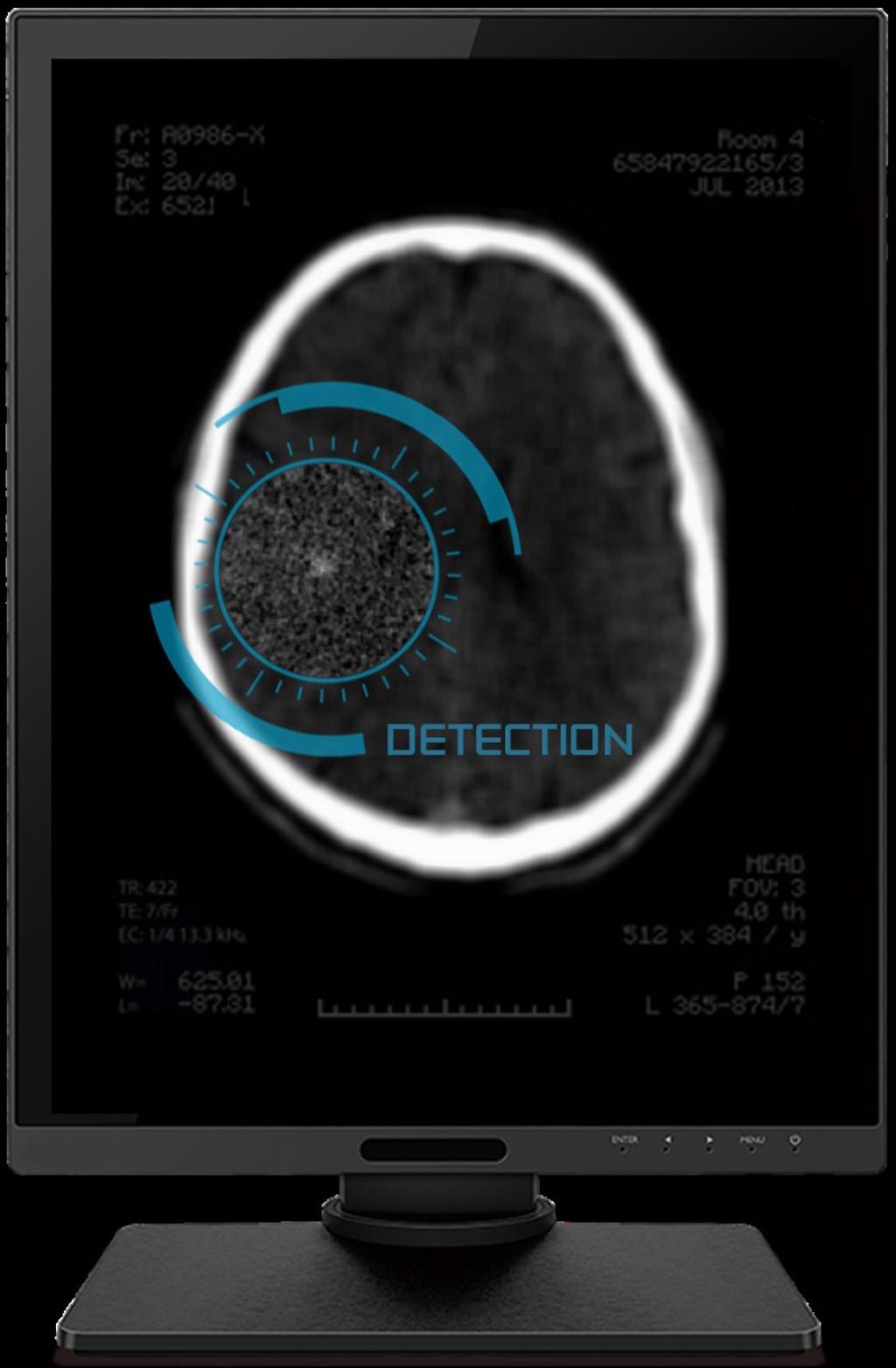FDA Gives Clearance to World's First Deep-Learning Solution to Assist Workflow Triage
|
By MedImaging International staff writers Posted on 15 Aug 2018 |

Image: The AI-based deep-learning solution is designed to assist workflow triage and improve response time (Photo courtesy of Aidoc).
A brain solution that works with radiologists to flag acute intracranial hemorrhage (ICH) cases in head CTs and is the world's first deep-learning solution to assist radiologists in workflow triage has been granted clearance by the Food and Drug Administration (FDA). The product is the first of the expanding suite of artificial intelligence (AI)-based workflow optimization solutions to be offered by Aidoc (Tel-Aviv, Israel), a provider of AI solutions for radiologists.
Aidoc develops AI solutions that support and enhance the impact of radiologist diagnostic power, helping them expedite patient treatment and improve quality of care. The company's solutions reduce turnaround time and increase quality and efficiency by flagging acute anomalies in real time. Radiologists benefit from state-of-the art deep-learning technology that runs "behind the scenes" freeing them to focus on the diagnosis itself. Aidoc's healthcare-grade deep-learning algorithms benefit from large quantities of data, making their solutions the most comprehensive in the field, and enabling them to provide diagnostic aid to the broadest set of pathologies.
According to studies, over 75% of all patient care involves radiology, resulting in growing amount of imaging, although the number of radiologists is falling far short of the requirement. Radiologists are under increasing pressure to produce quality results more quickly with increasing amounts of data, but lack the necessary tools. Aidoc provides advanced solutions for radiologists to increase efficiency and expedite patient care within their existing work environment.
Aidoc's solution analyzes medical images directly after the patient is scanned and notifies the radiologist about cases with suspected findings to assist in the prioritization of time-sensitive and potentially life-threatening cases. Aidoc's solutions have been commercialized outside the US since December 2017 and are already deployed in over 50 medical centers worldwide, where they are used daily, analyzing over one million exams every year. The company is now in the process of obtaining FDA clearance for the remainder of its solutions, which will assist in the detection of a broad set of acute pathologies across the body.
"We decided to focus our solution on acute pathologies where quality of care and time are of the essence," said Aidoc's CEO Elad Walach. "Radiologists are challenged with responding to large numbers of acute cases in a timely fashion. The key, we believe, is to be comprehensive. If you really want to impact the daily practice you have to cover a significant portion of the radiologist's workflow. Our solution can sift through the whole worklist in the background and highlight cases that require immediate attention, improving radiologist's response time."
Related Links:
Aidoc
Aidoc develops AI solutions that support and enhance the impact of radiologist diagnostic power, helping them expedite patient treatment and improve quality of care. The company's solutions reduce turnaround time and increase quality and efficiency by flagging acute anomalies in real time. Radiologists benefit from state-of-the art deep-learning technology that runs "behind the scenes" freeing them to focus on the diagnosis itself. Aidoc's healthcare-grade deep-learning algorithms benefit from large quantities of data, making their solutions the most comprehensive in the field, and enabling them to provide diagnostic aid to the broadest set of pathologies.
According to studies, over 75% of all patient care involves radiology, resulting in growing amount of imaging, although the number of radiologists is falling far short of the requirement. Radiologists are under increasing pressure to produce quality results more quickly with increasing amounts of data, but lack the necessary tools. Aidoc provides advanced solutions for radiologists to increase efficiency and expedite patient care within their existing work environment.
Aidoc's solution analyzes medical images directly after the patient is scanned and notifies the radiologist about cases with suspected findings to assist in the prioritization of time-sensitive and potentially life-threatening cases. Aidoc's solutions have been commercialized outside the US since December 2017 and are already deployed in over 50 medical centers worldwide, where they are used daily, analyzing over one million exams every year. The company is now in the process of obtaining FDA clearance for the remainder of its solutions, which will assist in the detection of a broad set of acute pathologies across the body.
"We decided to focus our solution on acute pathologies where quality of care and time are of the essence," said Aidoc's CEO Elad Walach. "Radiologists are challenged with responding to large numbers of acute cases in a timely fashion. The key, we believe, is to be comprehensive. If you really want to impact the daily practice you have to cover a significant portion of the radiologist's workflow. Our solution can sift through the whole worklist in the background and highlight cases that require immediate attention, improving radiologist's response time."
Related Links:
Aidoc
Latest Industry News News
- GE HealthCare and NVIDIA Collaboration to Reimagine Diagnostic Imaging
- Patient-Specific 3D-Printed Phantoms Transform CT Imaging
- Siemens and Sectra Collaborate on Enhancing Radiology Workflows
- Bracco Diagnostics and ColoWatch Partner to Expand Availability CRC Screening Tests Using Virtual Colonoscopy
- Mindray Partners with TeleRay to Streamline Ultrasound Delivery
- Philips and Medtronic Partner on Stroke Care
- Siemens and Medtronic Enter into Global Partnership for Advancing Spine Care Imaging Technologies
- RSNA 2024 Technical Exhibits to Showcase Latest Advances in Radiology
- Bracco Collaborates with Arrayus on Microbubble-Assisted Focused Ultrasound Therapy for Pancreatic Cancer
- Innovative Collaboration to Enhance Ischemic Stroke Detection and Elevate Standards in Diagnostic Imaging
- RSNA 2024 Registration Opens
- Microsoft collaborates with Leading Academic Medical Systems to Advance AI in Medical Imaging
- GE HealthCare Acquires Intelligent Ultrasound Group’s Clinical Artificial Intelligence Business
- Bayer and Rad AI Collaborate on Expanding Use of Cutting Edge AI Radiology Operational Solutions
- Polish Med-Tech Company BrainScan to Expand Extensively into Foreign Markets
- Hologic Acquires UK-Based Breast Surgical Guidance Company Endomagnetics Ltd.
Channels
Radiography
view channel
Machine Learning Algorithm Identifies Cardiovascular Risk from Routine Bone Density Scans
A new study published in the Journal of Bone and Mineral Research reveals that an automated machine learning program can predict the risk of cardiovascular events and falls or fractures by analyzing bone... Read more
AI Improves Early Detection of Interval Breast Cancers
Interval breast cancers, which occur between routine screenings, are easier to treat when detected earlier. Early detection can reduce the need for aggressive treatments and improve the chances of better outcomes.... Read more
World's Largest Class Single Crystal Diamond Radiation Detector Opens New Possibilities for Diagnostic Imaging
Diamonds possess ideal physical properties for radiation detection, such as exceptional thermal and chemical stability along with a quick response time. Made of carbon with an atomic number of six, diamonds... Read moreMRI
view channel
New MRI Technique Reveals Hidden Heart Issues
Traditional exercise stress tests conducted within an MRI machine require patients to lie flat, a position that artificially improves heart function by increasing stroke volume due to gravity-driven blood... Read more
Shorter MRI Exam Effectively Detects Cancer in Dense Breasts
Women with extremely dense breasts face a higher risk of missed breast cancer diagnoses, as dense glandular and fibrous tissue can obscure tumors on mammograms. While breast MRI is recommended for supplemental... Read moreUltrasound
view channel
New Incision-Free Technique Halts Growth of Debilitating Brain Lesions
Cerebral cavernous malformations (CCMs), also known as cavernomas, are abnormal clusters of blood vessels that can grow in the brain, spinal cord, or other parts of the body. While most cases remain asymptomatic,... Read more.jpeg)
AI-Powered Lung Ultrasound Outperforms Human Experts in Tuberculosis Diagnosis
Despite global declines in tuberculosis (TB) rates in previous years, the incidence of TB rose by 4.6% from 2020 to 2023. Early screening and rapid diagnosis are essential elements of the World Health... Read moreNuclear Medicine
view channel
New Imaging Approach Could Reduce Need for Biopsies to Monitor Prostate Cancer
Prostate cancer is the second leading cause of cancer-related death among men in the United States. However, the majority of older men diagnosed with prostate cancer have slow-growing, low-risk forms of... Read more
Novel Radiolabeled Antibody Improves Diagnosis and Treatment of Solid Tumors
Interleukin-13 receptor α-2 (IL13Rα2) is a cell surface receptor commonly found in solid tumors such as glioblastoma, melanoma, and breast cancer. It is minimally expressed in normal tissues, making it... Read moreGeneral/Advanced Imaging
view channel
First-Of-Its-Kind Wearable Device Offers Revolutionary Alternative to CT Scans
Currently, patients with conditions such as heart failure, pneumonia, or respiratory distress often require multiple imaging procedures that are intermittent, disruptive, and involve high levels of radiation.... Read more
AI-Based CT Scan Analysis Predicts Early-Stage Kidney Damage Due to Cancer Treatments
Radioligand therapy, a form of targeted nuclear medicine, has recently gained attention for its potential in treating specific types of tumors. However, one of the potential side effects of this therapy... Read moreImaging IT
view channel
New Google Cloud Medical Imaging Suite Makes Imaging Healthcare Data More Accessible
Medical imaging is a critical tool used to diagnose patients, and there are billions of medical images scanned globally each year. Imaging data accounts for about 90% of all healthcare data1 and, until... Read more






















